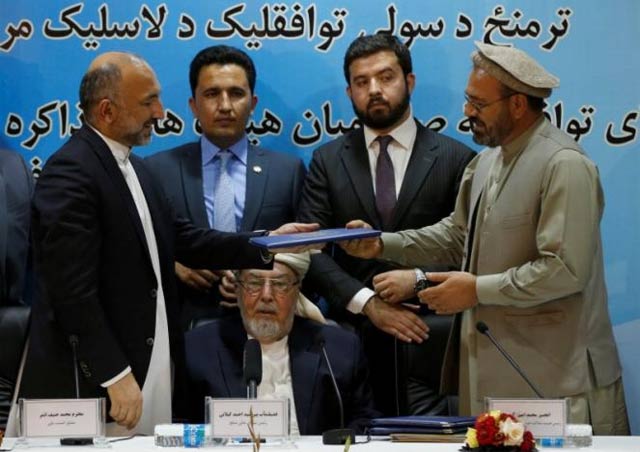
Afghan officials signed a peace deal on Thursday with a party led by Gulbuddin Hekmatyar, a move that inspired both hope and fear as it dredged up tensions dating back decades.
The militant faction of Hizb-e-Islami, led by Hekmatyar, has been battling to establish an Islamic state in Afghanistan.
Analysis: Hekmatyar could run for president
"This is positive in the sense that this represents a group that is residing largely outside of Afghanistan that is now reaching a reconciliation agreement with the government which will eventually involve a reintegration into Afghan society," Army General John Nicholson told reporters at the Pentagon.
"This is one of the most important steps we see towards an eventual resolution of the conflict in Afghanistan," Nicholson said.
Compared to other militant groups like the Taliban or Islamic State, however, Hizb-e-Islami has played a relatively small role in the insurgency recently, and analysts say the accord is mostly symbolic.
Peace talks with the Taliban, the largest insurgent group, have yet to get off the ground, but both sides have said they are open to the idea.
Fifteen years after the invasion of Afghanistan to topple the Taliban rulers who had harboured al Qaeda militants who attacked the United States, the Taliban have made major gains and are estimated to control more territory than at any time since 2001.
Ten per cent of territory in Afghanistan is currently controlled or under the influence of the Taliban, with as much as another 25 per cent being contested, Nicholson said.
Afghanistan inks peace deal with warlord 'butcher of Kabul'
A recent US watchdog report said the Afghan government lost control or influence of nearly 5 per cent of its territory between January and May, an indication of the challenges its forces are facing.
Nicholson added that he was concerned about the high level of casualties among Afghan forces, which mainly take place at check points that are often under-equipped.
Chairman of the Joint Chiefs of Staff General Joseph Dunford told a US Senate hearing this week that the security situation in Afghanistan was at a "stalemate" amid concerns about the Afghan security forces' capabilities.
In a sign of the different groups the Afghan government continues to battle, Nicholson said Islamic State in Syria was providing financial and leadership support to its Afghan branch, which had about 1,300 fighters, mainly in Nangarhar province.

1721394099-0/BeFunky-collage-(22)1721394099-0-165x106.webp)


1732762837-0/Taylor-(3)1732762837-0-165x106.webp)
1732772730-0/BeFunk_§_]__-(63)1732772730-0.jpg)

1726644416-0/TikTok-(2)1726644416-0-270x192.webp)









COMMENTS
Comments are moderated and generally will be posted if they are on-topic and not abusive.
For more information, please see our Comments FAQ